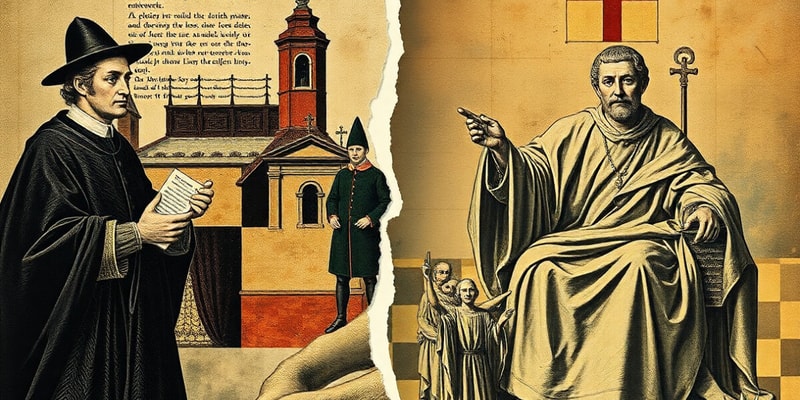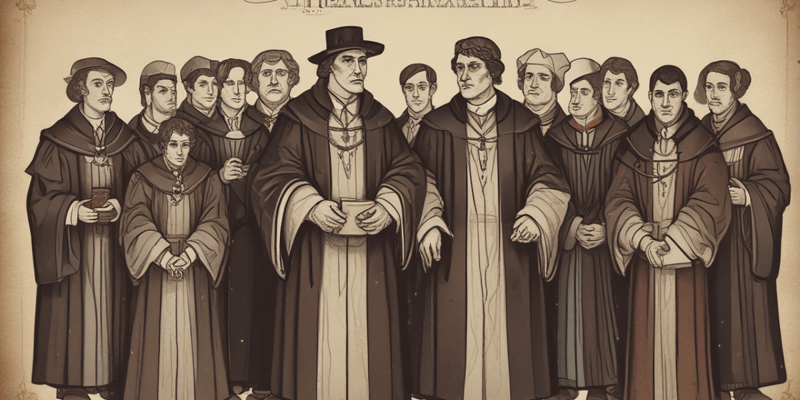Podcast
Questions and Answers
Match the following historical systems to their descriptions:
Match the following historical systems to their descriptions:
Hacienda System = System of large estates in Spanish America exploiting indigenous labor Encomienda System = Spanish labor system granting rights to extract labor from natives Taki Onqoy = Religious movement resisting Spanish rule in Peru Bhakti Movement = Religious movement in India promoting devotion and rejecting caste system
Match the following Enlightenment concepts with their explanations:
Match the following Enlightenment concepts with their explanations:
Social Contract Theory = Individuals surrender freedoms for protection and order Divine Right of Kings = Political doctrine asserting kings' authority from God European Enlightenment = Intellectual movement emphasizing reason and skepticism Encyclopedie = Work compiling knowledge to promote rational thought
Match the following events or works with their significance:
Match the following events or works with their significance:
Ninety-Five Theses = Critique of the Catholic Church leading to the Protestant Reformation Scientific Revolution = Period of major scientific advancement challenging medieval views Kaozheng = Movement in Qing China emphasizing evidence-based study of texts Bhakti Movement = Movement in India leading to the rise of devotional practices
Match the following figures to their associated contributions:
Match the following figures to their associated contributions:
Signup and view all the answers
Match the following political doctrines to their descriptions:
Match the following political doctrines to their descriptions:
Signup and view all the answers
Match the following movements with their geographical context:
Match the following movements with their geographical context:
Signup and view all the answers
Match the following concepts to their time periods:
Match the following concepts to their time periods:
Signup and view all the answers
Match the following thinkers to their ideas or works:
Match the following thinkers to their ideas or works:
Signup and view all the answers
Match the following terms with their definitions:
Match the following terms with their definitions:
Signup and view all the answers
Match the following historical movements or concepts with their descriptions:
Match the following historical movements or concepts with their descriptions:
Signup and view all the answers
Match key concepts related to Sikhism with their explanations:
Match key concepts related to Sikhism with their explanations:
Signup and view all the answers
Match the following literary and cultural works with their significance:
Match the following literary and cultural works with their significance:
Signup and view all the answers
Match the key figures or groups with their primary activities or characteristics:
Match the key figures or groups with their primary activities or characteristics:
Signup and view all the answers
Match the historical events to their impacts:
Match the historical events to their impacts:
Signup and view all the answers
Match religious concepts with their descriptions:
Match religious concepts with their descriptions:
Signup and view all the answers
Match the following terms with their contextual implications:
Match the following terms with their contextual implications:
Signup and view all the answers
Match the following movements with their key figures:
Match the following movements with their key figures:
Signup and view all the answers
Match the historical responses with their triggers:
Match the historical responses with their triggers:
Signup and view all the answers
Match each religious concept with its core belief:
Match each religious concept with its core belief:
Signup and view all the answers
Study Notes
Protestant Reformation
- Movement challenging Catholic practices, key figure Martin Luther
- Sparked by Luther's 95 Theses (1517)
- Criticized Church wealth, power, and corruption
- Advocated salvation through faith alone
Counter-Reformation
- Catholic Church's response to Protestant Reformation
- Reforms within the Church (e.g., Council of Trent)
- Focused on combating heresy and promoting Catholic doctrine
- Used the Inquisition and Jesuits to reassert authority
Society of Jesus (Jesuits)
- Roman Catholic religious order founded by Ignatius of Loyola (1540)
- Committed to education, missionary work, and opposing Protestantism
- Key role in spreading Catholicism globally
Cofradias
- Religious brotherhoods in Spanish/Portuguese colonies
- Formed by indigenous peoples
- Promoted religious devotion and charitable work
Fiscal
- Relating to financial matters (government revenues/expenditures)
- Used in discussions of economic systems (taxation etc.)
The Dream of the Red Chamber
- Classic Chinese novel by Cao Xueqin
- Examines Qing dynasty decline, aristocratic society
- Explores themes of family, love, and societal expectations
Sikhism
- Monotheistic religion founded in Punjab (late 15th century), Guru Nanak
- Emphasizes equality, social justice, and devotion to one God
- Rejected the caste system; honest living and meditation
Rise of Sikhism
- Emerged from social/religious tensions in India
- Influenced by Hinduism and Islam
- Guru Nanak's teachings emphasized equality and rejected rituals
Hacienda System
- Large estates in Spanish America, granted to settlers
- Hacienderos exploited indigenous labor
- Critical economic structure for Spanish America (agriculture, mining)
Encomienda System
- Spanish labor system in the Americas
- Spanish settlers granted forced indigenous labor
- Offered protection and Christianization in exchange
- Criticized for exploitation and abuse
Ninety-Five Theses
- Martin Luther's 1517 work criticizing Catholic Church (especially indulgences)
- Sparked the Protestant Reformation
- Challenged Church practices and doctrine
Kaozheng
- Qing China movement (late 17th/18th centuries)
- Emphasized research-based study of ancient texts
- Focused on accurate interpretations of the past based on evidence
Bhakti Movement
- Indian religious movement (medieval period)
- Emphasized devotion to a personal god
- Rejected the caste system and promoted devotion over rituals
Taki Onqoy
- Peruvian indigenous religious movement (16th century)
- Resisted Spanish colonial rule
- Believed gods would overthrow Spanish and restore native ways
European Enlightenment
- 17th/18th-century intellectual movement
- Emphasized reason, individualism, skepticism of authority
- Challenged traditional views on government, religion, society
- Advocated liberty, democracy, scientific progress
Divine Right of Kings
- Political doctrine asserting king's authority from God
- Justified absolute monarchy in Europe
Social Contract Theory
- Individuals consent to surrender freedoms to a government (protection)
- Key thinkers: Hobbes, Locke, Rousseau
Encyclopedie
- Major Enlightenment work (Diderot & d'Alembert, 1751-1772)
- Compiled and disseminated knowledge
- Challenged traditional authority, promoted rational thought
Scientific Revolution
- 16th/17th-century period of scientific advancement
- Questioned medieval universe view
- Key figures: Copernicus, Galileo, Kepler, Newton
- Laid groundwork for modern science and Enlightenment
Studying That Suits You
Use AI to generate personalized quizzes and flashcards to suit your learning preferences.
Description
Explore the key events and figures of the Protestant Reformation and the Catholic Church's response during the Counter-Reformation. This quiz covers topics like Martin Luther, the Society of Jesus, and fiscal matters related to the movements. Test your knowledge on how these significant changes shaped the religious landscape.



